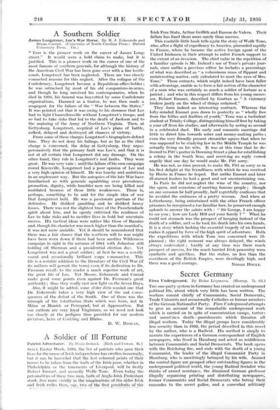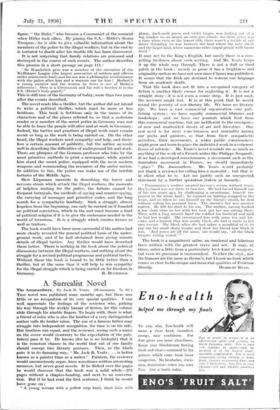Secret Germany
Fires Underground.. By Heinz Liepmann. (Harrap. 75. 6d.) THE one-party system in Germany has created an underground political life, about which very little has been written. The workers consist chiefly of Communists, Social Democrats; Trade Unionists and occasionally Catholics or former members of the German Nationalist Party. Fires Underground attempts to give an account of the remarkable underground work which is carried on in spite of concentration camps, torture and sometimes death—punishments which threaten all illegal workers. Toddy the illegal groups have considerably less security than in 1933, the period described in this novel by the author, who is a Radical. His method is simply to narrate the experiences of a German correspondent of English newspapers, who lived in Hamburg and acted as middleman between Communists and Social Democrats. The book opens with the Reichstag fire, and ends with the death of a young Communist, the leader of the illegal Communist Party in Hamburg, who is unwittingly betrayed by his wife. Around the' central figure are grouped other outstanding figures in the underground political world, the young Radical' Socialist who thinks of armed resistance, 'the dismissed German professor' illegally organising printing and distributing newspapers; former Communists and Social Democrats who betray their comrades to the secret police, and a somewhat arbitrary
figure, " the Duke," who became a Commuriist at the moment when Hitler took office. By joining the S.A.--Hitler's Storm Troopers—he is able to give valuable information about the members of the police to the illegal workers, but in the end he is tortured to death after his double life has been discovered. It is not surprising that family relations are poisoned and destroyed in the course of such events. The author describes this process in a short passage on page 111 :
" So Wunderlich pens was a member of the executive of the Kyffhtiuser League (the largest association of soldiers and officers under aristocratic lead) and his son was a philosophic revolutionary with the police after him and a warrant out for him ! Herbert's a young socialist and the woman ho loves is one of Hitler's adherents ! Otto is a Communist and his wife's brother is in the ELS. (Hitler's body-guard)."
This is still true of the Germany of today, more than two years after the events described.
The novel reads like a thriller, but the author did not intend to write a political thriller, which must be more or less fictitious. This book is fictitious only in the names of its characters and of the places referred to, so that a malicious reader or a member of the secret police in Germany may not be able to trace the people still alive and at work in Germany.
Indeed, the tactics and practices of illegal work must remain secret so long as the work is being carried on. On the other hand, the illegal workers need sympathy and help, and there.: fore certain amount of publicity, but the author succeeds well in describing the difficulties of underground life and work. There are glimpses of the German professor who tries by the most primitive methods to print a newspaper, while against him stand the secret police, equipped with the most modern weapons and commanding the resources of the entire nation.
In addition to this, the police can make use of the terrible tortures of the Middle Ages.
Herr Liepmann succeeds in describing the terror and nervous strain which attack the illegal workers, the moments of helpless waiting for the police, the failures caused by frequent betrayals, the methods of spying and counter-spying, the carrying of messages and primitive codes, and the long search for a sympathetic landlady. Such a struggle, almost hopeless from the beginning, can only be carried on if founded on political conviction, which in the end must become a kind of political religion if it is to give the endurance needed in the world of terrorism. It is a struggle which creates heroes as well as traitors.
The book would have been more successful if the author had more clearly revealed the general political basis of the under- ground work, and if he had abstained from giving minute details of illegal tactics. Any thriller would have described them better. There is nothing in the book about the political discussions between the illegal workers, and nothing about the struggle for a revised political programme and political tactics. Without these the book is bound to be little better than a thriller, but at the same time it will help to win sympathy for the illegal struggle which is being carried on for freedom in







































 Previous page
Previous page